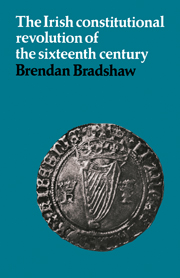Book contents
- Frontmatter
- Contents
- Dedication
- Preface
- Abbreviations
- Ireland about 1530
- PART I ‘A discourse of the cause of the evil state of Ireland and of the remedies thereof’
- 1 The medieval legacy
- 2 The Anglo-Irish movement for political reform
- 3 Henry VIII's Irish policy: Surrey's Irish expedition, 1520–2
- PART II The reform of the Lordship in the era of Thomas Cromwell, 1530–40
- PART III The liberal revolution
- Bibliography
- Index
1 - The medieval legacy
Published online by Cambridge University Press: 07 October 2011
- Frontmatter
- Contents
- Dedication
- Preface
- Abbreviations
- Ireland about 1530
- PART I ‘A discourse of the cause of the evil state of Ireland and of the remedies thereof’
- 1 The medieval legacy
- 2 The Anglo-Irish movement for political reform
- 3 Henry VIII's Irish policy: Surrey's Irish expedition, 1520–2
- PART II The reform of the Lordship in the era of Thomas Cromwell, 1530–40
- PART III The liberal revolution
- Bibliography
- Index
Summary
Historiography has highlighted Ireland's sixteenth-century rebellions and ignored its revolution. The transformation of the island's political personality in the course of the middle Tudor period must be the least remarked-upon change in its whole history. Yet it might be claimed to be the most remarkable. It provided Ireland with its first sovereign constitution, gave it for the first time an ideology of nationalism, and proposed a practical political objective which has inspired and eluded a host of political movements ever since: the unification of the island's pluralistic community into a coherent political entity.
The reason for the neglect lies partly in another remarkable feature of the revolution itself, the circumstances of its accomplishment. It was engineered by Anglo-Irish politicians, in collaboration with an English head of government in Ireland, and by constitutional means, in particular by parliamentary statute. Neither the agents nor the means were looked upon with favour by Ireland's latter-day revolutionaries, nor by those who fashioned Irish history in their image, while the more objective school of Irish historiography became settled in the assumption that the Anglo-Irish and their parliament were forces of reaction rather than of revolution in the sixteenth century. It remains to persuade them to the contrary.
Late medieval crown policy in Ireland
The perspective from which the middle Tudor period in Ireland is usually examined tends to obscure its unique significance. The point of reference is established further on, in Elizabethan conquest and colonisation. The middle period is treated as a dark and tangled undergrowth in which the historian gropes for strands of continuity with later developments. The uniqueness of the period itself remains unnoticed.
- Type
- Chapter
- Information
- Publisher: Cambridge University PressPrint publication year: 1979
- 1
- Cited by



